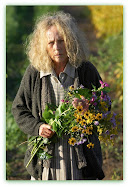Sunday, April 25, 2010
the raven himself is hoarse.......
......that croaks the fatal entrance of duncan
under my battlements. Come, you spirits
that tend on mortal thoughts, unsex me here,
And fill me from the crown to the toe top full
Of direst cruelty. Make thick my blood;
Stop up th' access and passage to remorse,
That no compuctious visitings of nature
Shake my fell purpose nor keep peace between
Th' effect and it. Come to my woman's breasts
And take my milk for gall, you murd'ring ministers,
Wherever in your sightless substances
You wait on nature's mischief. Come, thick night,
And pall thee in the dunnest smoke of hell,
That my keen knife see not the wound it makes
Nor heaven peep through the blanket of the dark
To cry 'Hold, hold !'
Lady MacBeth's soliloquy, Act 1 Sc 5.
The ultimate scheming political villainess ? Yet in the end, tortured by her own guilty conscience, she loses her sanity ("Out, damned spot; out, I say!" Act 5 Sc 1) & dies.
There's a longheld superstitious belief in international theatrical circles that any production of Shakespeare's MacBeth is vulnerable to an historic curse of disaster and / or failure. So strong is this superstition that one is not allowed, except in performance, to speak the MacBeth name, or quote a line from the play, in any quarters of a theatre or in any related space, for fear of invoking the curse. It's always referred to as "The Scottish Play". And the 2 pivotal characters as "his nibs" & Lady M. If one dares let slip the forbidden "M" word, there is an outcry & one must immediately perform a ritual of contrition : exit the theatre, spin around 3 times while uttering a profanity, then beg forgiveness & permission to re-enter. Other variations of absolution: spit over one's left shoulder; or repeat the rhyme "thrice around the circle bound, evil sink into the ground"; or spew out a quote from Hamlet " angels & ministers of grace defend us " (act 1 sc 4)
In the late '80's, I was involved in an outdoor summer production of MacBeth by the now-defunct Skylight Theatre, in Earl Bales Park, Toronto. During the opening night performance the set went up in flames. Pyrotechnics were being used, from beneath the stage, for dramatic effect during Act 4 Scene 1 , as the 3 Witches gather around the cauldron to invoke their own curses upon the nobleman MacBeth (double double, toil & trouble!) An errant spark flew out of the cauldron & ignited rigging that was part of the rear set decoration. In an instant it blasted into huge flames. The actors assembled behind the stage, awaiting their entrance cue, were stunned into disbelief & non-action ! Except for one just-out-of-theatre-school young apprentice actor, Rick, who rushed on stage, ripped down the flaming rigging & flung it into the deep ravine immediately behind the stage area. Immersed in their scene, the 3 witches seemed oblivious to the kerfuffle til it was all over... from the audience could be heard a palpable release of voyeuristic bated breath... backstage whispers cheered Rick as a hero &, without missing another beat, the play went on. That's the way of it. The show must go on. But most certainly that episode was considered a visitation, an attempt at infiltration, from the Scottish play's ominous curse. There are numerous stories, from all over the world, of the trials & tribulations of staging a production of MacBeth. Many much more horrendous even tragic in outcome than the example cited here. During the play's very first production, in 1606, Willy himself was forced to step up & play Lady MacBeth when the young boy cast in the role fell ill & died. In 1672, the actor playing MacBeth in an Amsterdam production substituted a real dagger for the harmless stage prop & stabbed the actor playing King Duncan to death, as the horrified audience watched in disbelief!! In 1721, hecklers became such an irritant at one performance that the actors attacked them with their swords & the army had to be summoned to quell the melee. The litany of catastrophes goes on : 1849....31 audience members trampled to death in a riot that broke out during a New York performance; 1937....when Laurence Olivier's sword snapped, a piece of the blade flew into the audience & hit a man, the shock causing him to have a heart-attack. He died ; 1953....Charlton Heston suffered severe burns of the groin & leg when his tights, accidently soaked in kerosene, combusted (huh?) ; through the ages, cast & crew members of innumerable productions of MacBeth have been afflicted by heart attacks, suicides, fires, collapsed sets, falls from the stage or rigging, strikes, robberies, serious illness, family tragedies. Makes our little fire at Skylight seem as inconsequential as it was inevitable !
NB: daring young Rick went on to have a very successful career as both an actor & playwright.
image : a raven claiming territory on Vancouver's Third Beach. / Though a scavenger, the raven has existed with humans for thousands of years. A member of the crow family, it has long been revered as both a messenger of God and, as Shakespeare uses it in MacBeth, a symbol of ill omen.
Subscribe to:
Post Comments (Atom)



3 comments:
Hi Ana, this story of a pharaoh-like curse is very suggestive ... when I was a child I was very impressed by such stories ... then, as a boy and a joung man I rejected such popular believes and resorted to the light of reason ... now I think that such things are a very deeply hidden part of human beings and stem from the source of life itself ... noneless the light of reason must be active to defeat monsters
Just to complete my previous comment ... it is also clear that, with a different language from that of pure reason, art is related to the hidden part of human beings so close to the source of life, and in fact it is able to produce something like "MacBeth" in order to manage it ...
Well probably since it was played that many time, the "probability" for something to go wrong increases.. haha.. well.. supernatural things does happen too.
anyway a very cool collection of events documented to support the curse claim :-)
koops.
Post a Comment